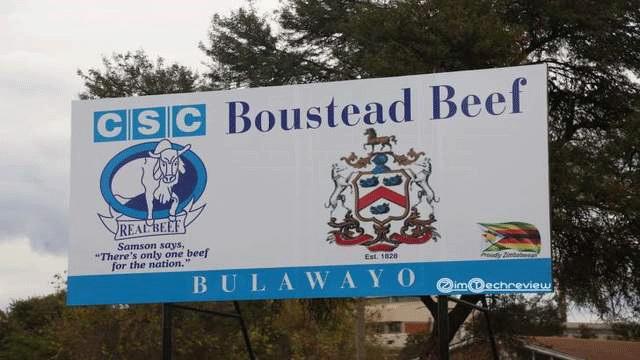News / National
CSC, Boustead Beef deal sparks court battle
21 Oct 2024 at 06:42hrs |
0 Views

The Cold Storage Company (CSC) has officially terminated its partnership with Boustead Beef, leading to legal action, according to Lands, Agriculture, Fisheries, Water and Rural Development Minister, Dr. Anxious Masuka. The decision follows Boustead Beef's failure to meet the obligations outlined in their agreement.
The partnership, initially set for 25 years with a US$135 million investment to revive CSC, has now dissolved after crucial aspects of the deal were not fulfilled. The Mutapa Investment Fund's chief executive, Dr. John Mangudya, had flagged these issues in June, leading CSC to initiate legal proceedings.
Speaking during a visit to Bulawayo last week, Dr. Masuka confirmed the developments, stating, "We have sought to disengage from that process, and that process is now a legal process." He emphasized that while CSC's revival is critical to Zimbabwe's livestock sector, the prolonged resuscitation efforts have left the public without adequate services.
The collapse of the partnership has raised concerns about CSC's role in the country's beef and leather value chains, prompting Dr. Masuka to urge government ministries to implement temporary measures, such as offering immediate slaughtering services for both small and large livestock.
The original deal between CSC and Boustead Beef, signed in 2019 under a rehabilitate, operate, and transfer agreement, aimed to restore the company's operations. Boustead Beef had rebranded CSC as Boustead Beef-Cold Storage Company of Zimbabwe, giving hope to the many families reliant on the once-flourishing enterprise. However, Boustead's injection of only US$24 million - far below the promised amount - has left the rehabilitation project unfinished.
Vice President Constantino Chiwenga had previously voiced disappointment in 2022, lamenting that the company had failed to deliver on its commitments. Although the partnership created 169 jobs and saw some progress in resuming operations, the company's output remained far below expectations, with daily cattle slaughtering limited to just 60, compared to the target of 2,000.
Founded in 1937, CSC had been a pivotal player in Zimbabwe's beef processing and export industry, particularly with the European Union (EU). The company once exported 9,100 tonnes of beef annually, earning around US$45 million through an EU quota. However, viability challenges led to its closure, and the EU suspended beef imports in 2001 following an outbreak of foot-and-mouth disease. CSC resumed operations in 2022, but the recovery has been slow.
The government's decision to disengage from Boustead Beef is intended to protect CSC's strategic importance in the livestock sector. Moving forward, CSC aims to increase its slaughter capacity, collaborate with livestock farmers, and eventually resume beef exports.
As legal proceedings unfold, the immediate focus will be on finding short-term solutions to ensure that slaughtering services are available while efforts to fully rehabilitate CSC continue.
The partnership, initially set for 25 years with a US$135 million investment to revive CSC, has now dissolved after crucial aspects of the deal were not fulfilled. The Mutapa Investment Fund's chief executive, Dr. John Mangudya, had flagged these issues in June, leading CSC to initiate legal proceedings.
Speaking during a visit to Bulawayo last week, Dr. Masuka confirmed the developments, stating, "We have sought to disengage from that process, and that process is now a legal process." He emphasized that while CSC's revival is critical to Zimbabwe's livestock sector, the prolonged resuscitation efforts have left the public without adequate services.
The collapse of the partnership has raised concerns about CSC's role in the country's beef and leather value chains, prompting Dr. Masuka to urge government ministries to implement temporary measures, such as offering immediate slaughtering services for both small and large livestock.
Vice President Constantino Chiwenga had previously voiced disappointment in 2022, lamenting that the company had failed to deliver on its commitments. Although the partnership created 169 jobs and saw some progress in resuming operations, the company's output remained far below expectations, with daily cattle slaughtering limited to just 60, compared to the target of 2,000.
Founded in 1937, CSC had been a pivotal player in Zimbabwe's beef processing and export industry, particularly with the European Union (EU). The company once exported 9,100 tonnes of beef annually, earning around US$45 million through an EU quota. However, viability challenges led to its closure, and the EU suspended beef imports in 2001 following an outbreak of foot-and-mouth disease. CSC resumed operations in 2022, but the recovery has been slow.
The government's decision to disengage from Boustead Beef is intended to protect CSC's strategic importance in the livestock sector. Moving forward, CSC aims to increase its slaughter capacity, collaborate with livestock farmers, and eventually resume beef exports.
As legal proceedings unfold, the immediate focus will be on finding short-term solutions to ensure that slaughtering services are available while efforts to fully rehabilitate CSC continue.
Source - The Herald
Join the discussion
Loading comments…































